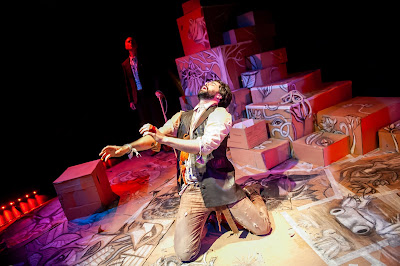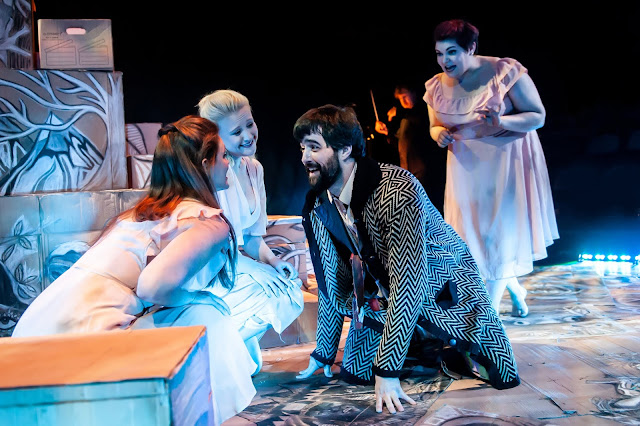 |
| Wagner: Das Rheingold - Andrew Tipple (Fasolt), Paul Carey Jones (Wotan), Gareth Brynmor John (Donner), Dingle Yandell (Fafner) - Grimeborn Festival (Photo Lidia Crisafulli) |
A fine cast give a wonderfully involving and engaging account of Jonathan Dove's small-scale adaptation of the preliminary evening of Wagner's tetralogy
 |
| Wagner: Das Rheingold - Seth Carico (Alberich) Grimeborn Festival (Photo Lidia Crisafulli) |
For its centrepiece opera at the Grimeborn Festival this year (seen 31 July 2019), the Arcola Theatre presented Julia Burbach's staging of Graham Vick and Jonathan Dove's adaptation of Wagner's Das Rheingold. Peter Selwyn conducted members of the Orpheus Sinfonia, with Paul Carey Jones as Wotan, Marianne Vidal as Fricka, Seth Carico as Alberich, Kiandra Howarth as Freia, Philip Sheffield as Loge, Harriet Williams as Erda, Dingle Yandell and Andrew Tipple as Fafner and Fasolt, Kiandra Howarth, Claire Barnett-Jones, Angharad Lyddon as the Rhinemaidens. Designs were by Bettina John and lighting by Robert Price.
The adaptation reduces the opera to a swift 100 minutes, and whilst one missed some of Wagner's repetitions the result is still enormously effective and has a paciness which suited the small space. Fitting 18 instrumentalists and 11 singers into the larger studio at the Arcola Theatre is no mean feat. The orchestra was partially hidden, placed behind a curtain at the back of the stage under the balcony in a space which seemed to descend into the depths in a manner wonderfully analogous to the narrative of Wagner's poem.
 |
| Wagner: Das Rheingold - Peter Selwyn (conductor), Paul Carey Jones (Wotan) Grimeborn Festival (Photo Lidia Crisafulli) |
Thus the opening of the opera wasn't an evocation of the Rhine, but an anonymous man (Seth Carico, who became Alberich) finding a cardboard box full of figures and a pair of headphones and being transported into the story. At the end he reappeared, still with his box of possessions. In between, the logic of this back-story was less apparent. Burbach told the story pretty straight, yet the modern updating and costumes meant that we were unsure whether Paul Carey Jones highly effective Wotan was a Norse God or a ego-maniacal capitalist in contemporary London.
Burbach drew strong and engaging performances from her cast, and performing the piece in such an intimate space with such a cast really brought the piece to life. This was a production which worked wonderfully well in terms of interaction of character on a personal level, and anyone who had never seen the opera before (and plenty of those of us who had) could not help but be drawn in. The singers' diction was excellent and it was easy to follow the German, and there were surtitles, but I thought that singing the piece in one of the good modern English translations was rather a missed opportunity (I learned the Ring in Andrew Porter's excellent translation).
 |
| Wagner: Das Rheingold - Kiandra Howarth (Freia), Marianne Vidal (Fricka) Grimeborn Festival (Photo Lidia Crisafulli) |
But these are the complaints of someone whose Ring experience started with Goodall at the English National Opera, and the highly theatrical first Goetz Friedrich Ring at Covent Garden. Burbach and her cast did an excellent job of bringing Wagner's story alive and drawing us into these characters, aided by a very high level of singing and instrumental playing.
Paul Carey Jones (the extremely camp Lescaut in Opera Holland Park's recent Puccini Manon Lescaut) will be playing Wotan in the full version of the Ring at Longborough from 2021, and on this showing I can't wait to see him in the role. This was a wonderfully complete portrayal of Wotan as egomaniac, truly self-absorbed in his vision. Carey Jones found an inner strength in his voice, and in Wotan's great pronouncements were wonderfully magisterial, yet there was also a sense of his delusion and separation from the realities of what was going on around him. Carey Jones paced himself very well indeed, so that the final 'Folge mir, Frau!' was thrillingly done, giving us the musical frisson that the staging lacked. As his wife, Marianne Vidal (who is sharing the role in the run with Claire Barnett-Jones) made an elegant Fricka, yet an effective opponent to Carey Jones' Wotan. The two made a handsome couple but Vidal certainly stood up to him. Yet this was quite a warmly elegant portrayal, I have seen more sardonic Frickas (both Helge Dernesch and Rosalind Plowright were wonderful masters of the withering put down here). Physically Vidal was impressive too, negotiating the tricky 'cardboard box' staircase in tall heels!
 |
| Wagner: Das Rheingold -The Rhinemaidens (Angharad Lyddon, Kiandra Howarth, Claire Barnett-Jones) and Alberich (Seth Carico) - Grimeborn Festival (Photo Lidia Crisafulli) |
Seth Carico was the lynchpin of the drama, beginning and ending it, and whilst you might quail at the identification of a homeless man with Wagner's Nibelung dwarf, Carico was impressive in the sheer physicality of his performance. Not that he threw himself around, but this was a performance which embodied Alberich both vocally and in terms of body language and expression. It was a complete performance that certainly made the character vivid in the small spaces. Carico found a strength in his voice for Alberich's curse in the first scene, but by the end he was starting to tire. Whilst Dove's orchestration means that the piece can be cast from lighter voices, they still need the stamina, even in this cut version Alberich is a long role. But Cario impressed to the end, making the most of his resources and giving us a vivid account of the role. This seems to be the first major Wagner that he has done, and if he can build on it he has the makings of a very fine Alberich indeed.
Dingle Yandell and Andrew Tipple as Fafner and Fasolt were workmen plain and simple, there was nothing giant-ish about them though Yandell certainly used his impressive height to great physical effect in the performance. Yandell aptly conveyed Fafner's growing obsession with the Ring, whilst Tipple's very human Fasolt remained enamored of Freia.
Kiandra Howarth doubled as the Rhinemaiden Woglinde and Freia (which perhaps explains why the gods entry into Valhalla was fudged, it wouldn't have been possible for Howarth to be in two places!). She made an appealing Freia, warm and maidenly. Howarth, Angharad Lyddon and Claire Barnett-Jones made a delightful trio of Rhinemaidens, rather sexy and teasing with a lovely blend in their singing.
There is no Froh in this version, but Gareth Brynmor John as Donner impressively fulfilled the dramatic requirements as Fricka's brother, standing up for his sisters' rights, and this fine performance was crowned by a truly thrilling and highly musical account of Donner's summoning of a storm (a great example of how Wagner' could crown such theatrical moments with a rattling good tune). Harriet Williams was a stunning Erda, certainly living up to her striking entry standing up from the audience. This was a focused, dramatic and resonant account of Erda's warning, thrilling and commanding and I certainly wanted to hear more of her.
In the pit, largely hidden from view, the 18 members of the Orpheus Sinfonia did wonders under Peter Selwyn's expert direction. Dove's orchestration is wonderful for the way he manages to suggest the fuller version, and there was many incidental instrumental felicities once a few uncertainties had been ironed out. Selwyn was expert at keep his disparate ensemble together in a situation where few of the soloists could see him directly. The result was a pacey affair, entirely apt for the space and the audience.
This production was a terrific achievement, and I am sure it will develop and broaden as the run progresses (there are a total of eight performances until 9 August 2019). I suppose it is too much to hope for that we might get more of the tetralogy in future years!
This review also appears on OperaToday.com
Elsewhere on this blog
- Kynance Cove, On the South Downs: Truro Cathedral Choir & BBC Concert Orchestra in Dobrinka Tabakova (★★★½) - CD review
- Second View: Prokofiev’s War and Peace - a work
ranging from the intensity of personal emotion to the grit of national
determination - was also grand and intimate at the same time (★★★★) - opera review
- The Romantic Violin Concerto: Linus Roth in Lassen, Scharwenka, Langgaard (★★★½) - CD review
- Shards of sound: Messiaen's Des Canyons aux Étoiles at the Proms - concert review
- Sheer enjoyment: Rossini's La Cenerentola at West Green House (★★★★) - opera review
- The power of culture has not lessened in its ability to forge a
better relationship: Jan Latham Koenig on founding the
Britten-Shostakovich Festival Orchestra - interview
- A welcome chance to hear Cilea's other opera: a warmly musical account of L'Arlesiana at Opera Holland Park (★★★★) - Opera review
- Mio caro Händel: a very personal project from soprano Simone Kermes on Sony Classical (★★★) - cd review
- Prom 4: Adams, Samuel Barber, Holst from Bournemouth Symphony Orchestra, Kirill Karabits and Nemanja Radulovic (★★★★★) - concert review
- War & Peace: Welsh National Opera brings its superb production of Prokofiev's opera to London (★★★★) - opera review
- Powerful contrasts: Wolf-Ferrari and Tchaikovsky in Opera Holland Park's double bill (★★★★½) - opera review
- Prom 2: Dvořák’s Violin Concerto paired with Smetana’s Má vlast (★★★★) - concert review
- First NIght of the Proms: Janacek, Dvorak and Zosha Di Castri launch the 2019 BBC Proms (★★★★) - concert review
- Leonardo Vinci's 1726 opera Siroe in its world premiere recording from the Teatro San Carlo, Naples (★★★½) - CD review
- Home











No comments:
Post a Comment